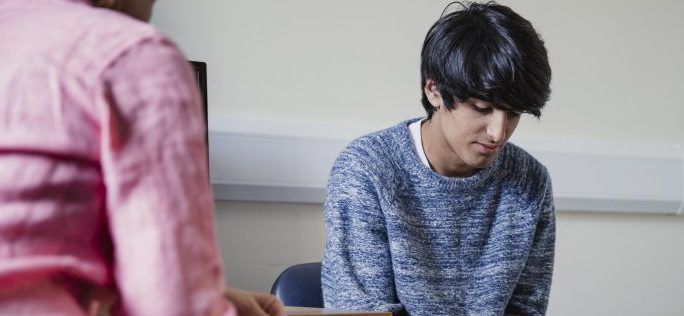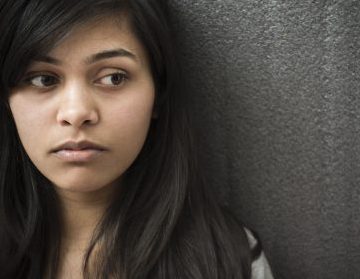Abuse
Unfortunately home is not always the loving place it’s supposed to be. Everyone disagrees or fights with their family occasionally, but no one should feel unsafe or unwelcome in their own home. If you or someone you know has trouble at home and feels unsafe, the environment may be an abusive one. Many people think you have to have bruises or a broken bone to be abused. That’s just not true. Physical abuse is the most obvious because it’s the easiest to see, but other kinds of abuse can be just as painful and have long term damaging effects.
Looking for info on dating violence, or abuse in romantic relationships? Click here.
Types of Abuse
There are several types of abuse, but they often occur together. Abuse doesn’t always fit into neat categories.
Physical abuse
Physical abuse includes any action that causes physical injury or pain. Hitting, slapping, beating, shaking, choking, burning, twisting an arm, throwing someone or something at someone, or any other action that hurts your body is physical abuse. Your parent or guardian may say their actions are taken to discipline you, but it is physical abuse if you are hurt or afraid for your safety. Often abusive actions are done in anger and make you fearful.
Sexual abuse
Any unwanted or forced sexual activity is sexual abuse. This includes any unwanted sexual touching, being forced to touch someone else or watch sexual acts or images (including porn), someone looking at you in a way that makes you feel very uncomfortable, and other situations. When adults have any kind of sexual contact with someone under age 18, it is considered sexual abuse. Incest is when a family member sexually abuses another family member. This could be a parent abusing a child or an older sibling abusing a younger one. Sexual assault, when someone forces you to have sex, is also sexual abuse.
Even more than with other kinds of abuse, young people who are sexually abused often feel shame and guilt, and that they are somehow responsible for it. This is NOT true. Abusers often manipulate their victims so they are less likely to tell others. We talk more about shame and guilt below.
Emotional abuse
Others may not be able to see emotional abuse, but it causes deep, lasting hurt and damage. It includes yelling, excessive anger, threatening, constant criticizing, belittling, shaming or dismissing you or your feelings. This can damage someone’s feelings of self-worth and self-esteem.
Neglect
Neglect can be more subtle. This is when a parent or caregiver doesn’t provide the physical or emotional needs of their child or someone they’re taking care of. Neglect includes when a parent or other caregiver doesn’t provide basic needs like enough food, shelter, clothing, bathroom or shower space, or supervision. It is also neglect if they ignore their child, don’t provide emotional support, or rarely pay any attention to the child. Sometimes neglect happens because a parent or guardian is physically or mentally unable to care for a child or teen. Parental alcohol or drug abuse or dependency can also lead to neglect.
Witnessing abuse
Witnessing abuse can be just as scary, damaging, and unhealthy as experiencing abuse. This could be one parent or caregiver abusing the other, or abusing a sibling or someone else. If you or someone you know is witnessing violence, take it seriously.
Effects of Abuse
It’s common for young people to not realize they’re being abused. If you’ve lived with it for a long time, you might think that’s just the way life is and there’s nothing you can do. Witnessing domestic violence day in and day out can lead you to think that’s a normal way to behave. If you’re not sure if you’re living with abuse, ask a trusted adult or a friend. They may be able to see the situation more clearly.
Someone who has been abused may have problems sleeping and eating. They may feel angry or afraid and have trouble in school, and have difficulty concentrating. Abuse can cause depression and feelings of hopelessness. Some teens try to feel better by cutting or abusing drugs or alcohol. Some attempt suicide.
The most important thing to remember is that the abuse is NOT YOUR FAULT. It is very common for abusers to convince the people they abuse that they deserve it: “If you just did what I said, I wouldn’t have to discipline you.” “You’re too stupid to understand anything else.” Abusers do this because they do not want anyone else to know about the abuse.
Abuse may make you feel shame, guilt or embarrassment. You may also feel worthless or unlovable. This is very common. Again, this is not your fault. You are not worthless. You are not alone.
How to Get Help
Often people who are abused are afraid to report it. The abuser may threaten to hurt them or a family member if they tell anyone, or convince them that no one will believe their story, or place the blame on the victim. The family may be dependent on the abuser for financial support. Sometimes the abuser is someone they love, and they are afraid of what will happen if they report the abuse. The abuser may also convince them that they deserve the abuse or are unworthy of love. Much of the time abuse goes unreported, and young people suffer the effects in silence.
If you or someone you know is being abused, you need to get help. Talk to someone you trust, like a teacher, a doctor, a school counselor, a religious leader, or a family member. If you are 10-22 years old and live in the NYC area, you can call or come to Mount Sinai Adolescent Health Center, and we’ll help you get the help you need to be safe.
If you have been abused in the past you may have painful emotions and anger, even after the abuse has stopped. Working with a therapist can help you heal and learn how to cope with what you’re feeling. Our mental health professionals are here to give you the support you need if you are in the New York City area. Here are some other resources.
Resources
If you are in immediate danger, call 911.
The National Domestic Violence Hotline 1-800-799-7233
National Child Abuse Hotline 1-800-4-A-CHILD (1-800-422-4453) Crisis counselors provide intervention and referrals to emergency, social service, and support resources, 24/7.
If you’ve been sexually abused or assaulted, you can call the RAINN (Rape, Abuse & Incest National Network) hotline: 800-656-4673
The New York County District Attorney’s Office Child Abuse Hotline 212-335-4308
New York State Office of Children and Family Services Child Protective Services 1-800-342-3720
This information is not intended to provide medical advice, professional diagnosis, opinion, treatment or services, only general information for education purposes only.


